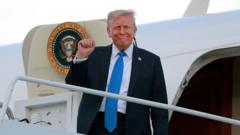As Friedrich Merz steps into the role of Chancellor, he is confronted with an economy in stagnation and rising nationalist sentiments, marking his entry into a tumultuous political landscape.
Friedrich Merz Takes the Helm as Germany's Chancellor Amidst National Challenges

Friedrich Merz Takes the Helm as Germany's Chancellor Amidst National Challenges
Friedrich Merz assumes the chancellorship at a pivotal moment for Germany, facing economic and political hurdles.
Friedrich Merz, soon to be inaugurated as Germany's 10th chancellor, is stepping into one of the most demanding periods for the nation since its reunification over three decades ago. The challenges he faces are manifold, framed by a lackluster economy and the emergence of a powerful nationalist party that disrupts the political equilibrium.
Back in the early 2000s, before his return to politics from a corporate law career, Merz had quite the adventure; he once parachuted into a gathering of the French Foreign Legion, showcasing his boldness even then. Now 69, he is prepared for another daring leap, albeit one involving significant political stakes rather than thrilling adventures.
Merz heads a coalition led by the center-right Christian Democrats, tasked with navigating through crises that have arisen in Germany's socio-political fabric. Rising inflation and economic stagnation are just the tip of the iceberg; additionally, his administration will need to manage complex and frayed relationships internationally, particularly with the United States.
A significant point of concern is the increasing prominence of the Alternative for Germany (AfD), a nationalist party that recently received classification as extremist by German domestic intelligence authorities. This party has consistently outperformed mainstream options like the Christian Democrats in recent opinion polls, reflecting a shift in voter sentiment that Merz's administration must address swiftly and effectively.
With all eyes on him, Merz's ability to unify a divided electorate while restoring confidence in government will be critical as he embarks on this new chapter in Germany's political landscape. The questions now remain: How will he address these pressing issues? And can he stabilize a country at a crossroads?



















